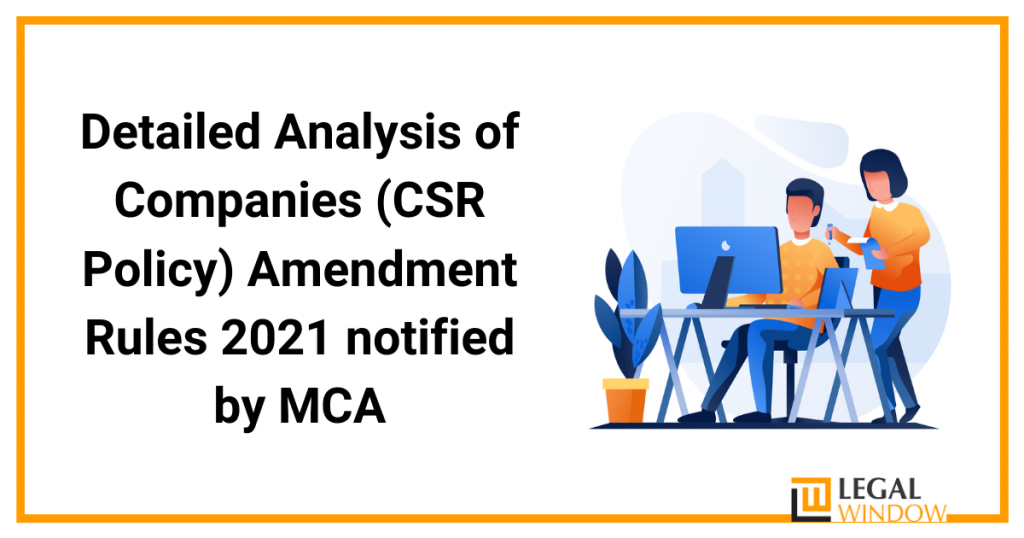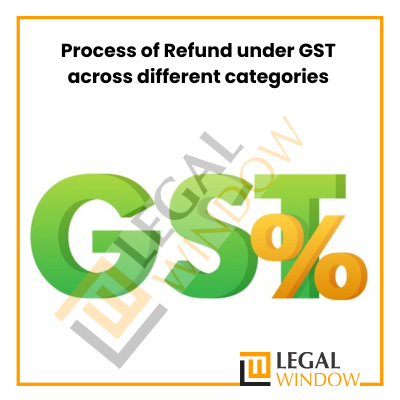Detailed Analysis of Companies (CSR Policy) Amendment Rules 2021 notified by MCA
- February 12, 2021
- Company Law
The Ministry of Corporate Affairs recently announced the new Corporate Social Responsibility Rules, which will be called Companies (Corporate Social Responsibility Policy) Amendment Rules, 2021. the Ministry of Corporate Affairs (MCA), by way of powers conferred under section 135 and 469 (1) and (2) of the Companies Act 2013, has decided to amend the provisions of Companies (Corporate Social Responsibility Policy) Rules 2014. Further, the said rules will be known as Companies (Corporate Social Responsibility Policy) Amendment Rules 2021. Also, these rules will come into force from the date of its publication in the Official Gazette, i.e., 22.01.2021.
Concept of Corporate Social Responsibility
The term CSR or Corporate Social Responsibility denotes a self-regulating business model that assists a company in becoming socially accountable towards its stakeholders and the general public. The main aim behind the implementation of CSR policy was to make companies responsible for enhancing the environment and society, instead of contributing negatively towards them.
Further, section 135 of the Companies Act 2013 governs the activities undertaken by companies as CSR. Also, it shall be relevant to take into the record that the provisions of CSR are based on the globally accepted concept of COREX. The term COREX stands for Comply or Explain.
Reasons to Make Amendments in Companies (Corporate Social Responsibility Policy) Rules 2014
The main reason for making amendments in Companies (Corporate Social Responsibility Policy) Rules 2014 are as follows:
- To Infuse more Transparency; and
- To Increase Accountability;

Key highlights which a company undertaking Corporate Social Responsibility Policy should note
Some of the significant changes are as follows:
- Compulsory registration with MCA
As per the amended laws, from 01.04.2021 onwards, every business entity or company that intends to undertake any CSR Activity will need to register itself with the CG or Central Government. The same can be done by filing form CSR 1 with the ROC (Registrar or Companies).
However, it shall be significant to state that in case a company is undertaking a new CSR project form 01.04.2021, then, in that case, form CSR 1 will need to be first signed and verified by a Practicing CA, CS or Cost Accountant in practice prior to its submission.
Further, after submitting the form online on the official website, a unique CSR Registration Number will be generated automatically, which will assist the companies in identifying the entities that are engaged in CSR activities on behalf of other companies. The same will enhance the level of transparency as well.
- Hiring Independent agency
As per the amended rules, any corporation with a CSR obligation of 10 crore rupees or more for three preceding financial years shall be required to hire an independent agency to conduct an impact assessment of all their projects with outlays of 1 crore rupees or more. Companies would be permitted to count 5% of the CSR expenditure for the year up to 50 lakh rupees on impact assessment towards CSR expenditure.
- Information sharing from entities undertaking CSR activity
Every entity that undertakes CSR activity is required to share the details about impact assessment for big CSR projects, an annual action plan for CSR by the board every year in addition to the Corporate Social Responsibility policy, carry forward and set off of CSR expenditure, Mandatory disclosure of CSR projects and activities on the company’s website, tweaks in reporting formats of the Board report, capital asset acquisition and its holding and Transfer of unspent amount to government notified fund.
- Specifying reasons for failure to spend net profit towards CSR
As you would be aware of the law that all companies with a net worth of 500 crore rupees or more, a turnover of 1000 crore rupees or more, or net profit of 5 crore rupees or more should spend 2% of the average profits of the last three years on CSR activities every year.
According to the new rules notified in case where a company fails to spend the earmarked 2% of the net profit towards CSR, it would then be required to specify reasons for not spending such amount and unless unspent amount relates to any ongoing project then transfer the same to a government notified fund.
Companies can also get involved with international organizations for designing, monitoring, and evaluating the CSR projects or programmes as per its CSR policy and for capacity building of their own personnel for CSR.
- Collaboration with Other Companies for undertaking CSR Programmes
As per sub rule (4) of Rule (4) of the Companies (CSR Policy) Amendment Rules 2021, a company or a business entity has the power to collaborate with other companies for undertaking CSR programmes and projects. However, it shall be taken into due consideration that the decided collaboration must be done in such a way that CSR Committees of the involved companies are in a position to separately file reports on such programmes or projects. Also, such a report must be in accordance with the rules passed.
- Activities included in CSR
The activities undertaken by entities in pursuance of its statutory obligation provided in Section 135 of the Act as per the provision contained in the Companies (CSR Policy) Amendment Rules, 2021.
Activities undertaken in the pursuance of the normal course of business of the company engaged in R&D activity of new vaccine, drug, and medical devices in their normal course of business may undertake R&D activity of the new vaccine, drugs, and medical devices relating to Covid-19 for the financial year 2020-21, 22, 23 subject to conditions.
- Activities excluded from CSR
The activities not included in the CSR activities include the following-- Activities undertaken in pursuance of the normal course of business of the company;
- Any activity undertaken by the company outside India;
- Activities benefiting employees of the company as provided in clause (k) of section 2 of the Code on Wages, 2019;
- Activities supported by companies in the basis of sponsorship for deriving marketing benefits for its products or services; and
- Activities carried out for the fulfilment of any other statutory obligations under the law in India.
- CSR expenditure
The board has to make sure that the administrative overheads does not exceed 5% of the total CSR expenditure of the company for the financial year. In case of any surplus arising out of CSR activities, shall not form part of the business profit, and it will be sent back into the same project or gets transferred to the unspent CSR account and spent in Corporate Social Responsibility Policy pursuance and annual action plan of the company within 6 months of the expiry of the financial year.
Wrapping Up
In a nutshell, Corporate Social Responsibility denotes a self-regulating business model that is based on a globally accepted concept named COREX. Further, section 135 of the Companies Act 2013, acts as the regulatory force for all the CSR related issues.
Also, recently, the MCA or Ministry of Corporate Affairs have amended some of the Companies (Corporate Social Responsibility Policy) Rules 2014, to infuse more transparency and increase the level of accountability of the companies towards the enhancement of environment and society. The amendment in the said rules is known as the Companies (Corporate Social Responsibility Policy) Amendment Rules 2021.
Lastly, in case of any doubt or dilemma, reach out to Legal Window, our proficient and skilled Chartered Accountants and Company Secretaries are always there to serve you with the best advice and guidance.
CA Pulkit Goyal, is a fellow member of the Institute of Chartered Accountants of India (ICAI) having 10 years of experience in the profession of Chartered Accountancy and thorough understanding of the corporate as well as non-corporate entities taxation system. His core area of practice is foreign company taxation which has given him an edge in analytical thinking & executing assignments with a unique perspective. He has worked as a consultant with professionally managed corporates. He has experience of writing in different areas and keep at pace with the latest changes and analyze the different implications of various provisions of the act.
Categories
- Agreement Drafting (23)
- Annual Compliance (11)
- Change in Business (36)
- Company Law (147)
- Compliance (88)
- Digital Banking (3)
- Drug License (3)
- FEMA (17)
- Finance Company (42)
- Foreign Taxation (6)
- FSSAI License/Registration (14)
- GST (116)
- Hallmark Registration (1)
- Income Tax (199)
- Latest News (34)
- Miscellaneous (164)
- NBFC Registration (8)
- NGO (14)
- SEBI Registration (6)
- Section 8 Company (7)
- Start and manage a business (20)
- Startup/ Registration (126)
- Trademark Registration/IPR (40)
Recent Posts
About us
LegalWindow.in is a professional technology driven platform of multidisciplined experts like CA/CS/Lawyers spanning with an aim to provide concrete solution to individuals, start-ups and other business organisation by maximising their growth at an affordable cost.







